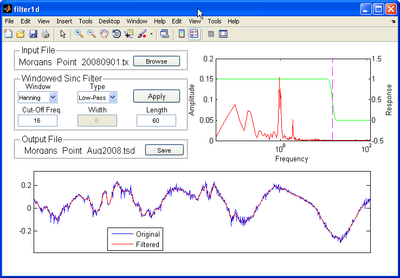Utilities: Difference between revisions
Jump to navigation
Jump to search
| Line 2: | Line 2: | ||
* [[Media:filter1d.rar | Filter1D: Time Series Analysis Tool]] | * [[Media:filter1d.rar | Filter1D: Time Series Analysis Tool]] | ||
[[File:filter1d.png|thumb|right|400px|filter1d.m]] | [[File:filter1d.png|thumb|right|400px|filter1d.m]] | ||
** The Matlab utility provides users of the SMS, a one-stop package for preparing model input time series and allows users to interpolate, resample, filter, and transform any type of model forcing and supports SMS compatible file formats for ease of data transfer. | |||
** The main feature of the software is the ability to apply high-pass, low-pass, band-pass, and band-stop filters to time series. | |||
** There are many types of filters available, and each have their own advantages and disadvantages. | |||
** Filter1D uses a windowed sinc filter which is a non-recursive finite impulse response filter. | |||
<br style="clear:both" /> | <br style="clear:both" /> | ||
Revision as of 16:16, 24 May 2010
Time Series Analysis
- The Matlab utility provides users of the SMS, a one-stop package for preparing model input time series and allows users to interpolate, resample, filter, and transform any type of model forcing and supports SMS compatible file formats for ease of data transfer.
- The main feature of the software is the ability to apply high-pass, low-pass, band-pass, and band-stop filters to time series.
- There are many types of filters available, and each have their own advantages and disadvantages.
- Filter1D uses a windowed sinc filter which is a non-recursive finite impulse response filter.
